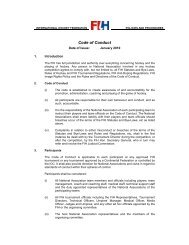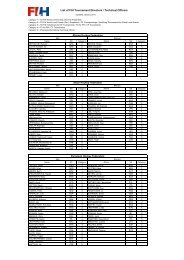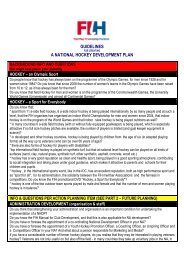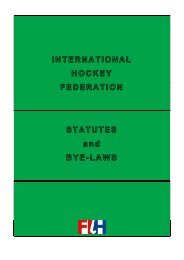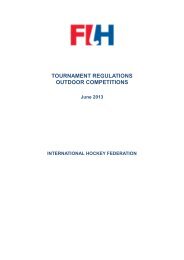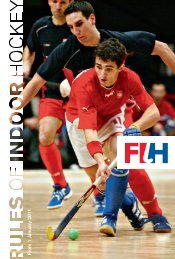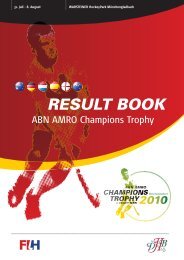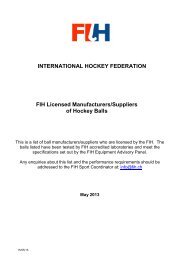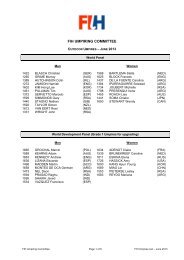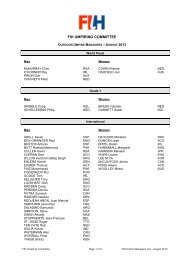Umpire's Handbook - International Hockey Federation
Umpire's Handbook - International Hockey Federation
Umpire's Handbook - International Hockey Federation
You also want an ePaper? Increase the reach of your titles
YUMPU automatically turns print PDFs into web optimized ePapers that Google loves.
INTERNATIONAL UMPIRES HANDBOOK 2005 Appendix 1.Mental PreparationA strong relationship exists between the psychological skills and the physical performanceof umpires. Indeed, the success or failure of an umpire depends on his or her physicalability (i.e. conditioning for the demands of hockey, techniques, visual skills) and mentalability (i.e. confidence, concentration, emotional control).Just as physical skills can be learned, so can psychological skills. Effective umpires arenot born with a complete set of psychological skills. Their ability to concentrate, relaxunder pressure, maintain confidence and relate to players and officials is systematicallyand repeatedly practised.In order to develop psychological skills (become better mentally prepared) a number ofkey elements need to be considered:• Communication• Confidence• Concentration• Motivation• Relaxation• Mental Imagery.1. CommunicationAn umpire who has a pleasant style, quick smile and calm demeanour creates a moresoothing effect on players and coaches. Communication is a two-day business; keepthe lines of communication open and you will be more likely to have constructive andenjoyable relationships with players, coaches and spectators.2. ConfidenceResearch indicates that confidence is the one factor that separates highly successfulumpires from less successful umpires. Confident umpires believe in themselves andtheir ability to meet the challenges and decisions they face during a match. Theyhave a high expectancy of success. However, it is worth noting that regrettably, manyumpires are either over-confident or under-confident. It should be noted thatconfidence alone does not overcome incompetence.3. ConcentrationAlthough it would seem relatively easy to focus on the action in the game, inevitably awide variety of irrelevant interruptions compete for an umpire’s attention. These mayinclude a hostile group of spectators, poor weather conditions, a particularly vociferouscoach, etc.Umpires are advised to try to keep the mind free of the distractions around them andfocus their attention on the action. In preparing to concentrate they must learn:• to cope effectively with pressure and anxiety;• to selectively attend to relevant areas while ignoring irrelevant areas(distraction).• to rapidly re-focus attention on the immediate task if distracted.



